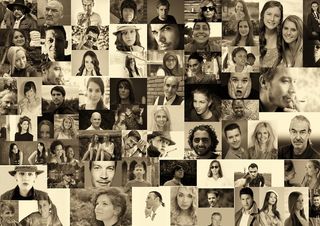
When well-meaning people with good intentions say, "I don't see color," an ethnic minority will internalize that as meaning, "You don't see me." Part of the problem with our country’s desire to be “post-racial” and color-blind in terms of seeing the inherent worth of an individual regardless of skin color, is that you can dismiss all the concerns, experiences, and real-world issues of racism that plagues this country from both an individual and larger societal level.
I was reminded of this when attending a race and faith training and hearing people from different ethnic minorities speak their truth. Discrimination, prejudice, and stereotypes are the ones most people in white America are familiar with and maybe even tired of hearing us talk about them. But there are also the more subtle issue of microaggressions and the inherent stress of trying to assimilate to a white, mainstream culture that is oftentimes ignorant of these stressors.
Microaggressions are a good place to start as these are defined as the everyday verbal, nonverbal, and environmental slights, or insults, whether intentional or unintentional, which communicate hostile, derogatory, or negative messages to people based solely on their marginalized group membership.
Some examples of microaggressions include:
- “Where are you from?”
- “You speak such good English.”
- “You’re not really Black.”
- "You're not really eating that are you?"
- “What are you?”
- “There is only one race — the human race!”
- “I’m not racist, I have several (Black, Asian, Latino) friends.”
- “Why do you have to be so loud?!”
- “Why do you have to be so quiet?”
- “You’re a credit to your race.”
Beyond the microaggressions, stereotypes, and other forms of overt racism that we can see and name, there’s the stress of just being ethnic in America which many people would like to downplay including myself.
For many years, I denied the stress and emotional, psychological, and spiritual impact this had on me. This may sound like a foreign concept to the dominant culture, so I'll give some personal examples.
For example, being Asian-American is an identity that I’ve been sensitive to for as long as I can remember. Part of this is the desire to fit in with both Black culture and white mainstream America. Growing up in a predominantly African-American neighborhood, I knew I was different so I did what I could to try and assimilate as quickly as possible to avoid getting teased. (It didn’t matter; the teasing still happened).
Assimilation meant “proving I was American” so much so that I chose to speak English when parents or relatives talked to us in public, all in an effort to garner acceptance from society. Hiding Asian food or ditching it altogether became normative due to teasing. This became so insidious, I distanced myself and excluded my two younger brothers from hanging out with me, thinking my chances to get accepted might be threatened if they were around (the impact from this remains a story of brokenness).
Growing up Asian also meant if you are in white neighborhoods, malls, restaurants, or other public areas; your “ethnic antenna” goes up. It doesn’t stop just because I’m an adult now and we live in a more culturally, diverse and aware society. The antenna stays vigilant as a means to warn me of any incoming threat, suspicion, or rejection from others. One thought that’s often running through an ethnic person’s mind in a majority setting is, “How much of this is because of my race or culture?”
I can remember going out in large numbers (6 or more) as a group of Asian-Americans starting in my teenage years and wondering what white customers saw when they noticed us. More specifically, I wondered internally, “Am I accepted here?” This doesn’t end simply with the passage of time because there are reminders that we are not welcome or continually perceived as foreign. Two years ago on our annual camping trip to Eastern Washington (a predominantly white part of the state), a boat cruised by our campsite pointing and shouting, “There’s China!”
Other incidents can involve inclusion or exclusion. If you’re hired, you wonder did race play a role and will other employees ask themselves similar questions. If you’re not hired, you wonder how much was related to your race?
I remember my first job interview was at an all-Black-staffed McDonald’s where I didn’t get the job and wondered if it due to being Asian. I went further away to a white community and applied at an all-white employed car wash and didn’t get that job either wondering the same question. I ended up getting a bagger position at a Chinese grocery store where I was teased for not knowing how to speak Chinese well. So in all these formative years, the question of how to fit in and what to do to fit in and find a place of acceptance remained central, although mostly on either a subconscious or reflexive, survival mechanism level.
When I graduated from high school and went college, I wondered if my admission was based on affirmative action. My white friends in the dorm would talk about how affirmative action took away spots from them and also questioned my need to join an Asian-American student club, by citing the double-standard that they couldn’t start an all-white club without getting accused of racism. As a young man, I had no answers to those questions but meekly tried to blend in and apologized for race being such an issue.
But paradoxically white friends had free reign to criticize and disparage R&B music and make judgments about people like myself who listened to it. One friend even asked me pointedly, “Why do you listen to that?! Have you heard the lyrics, it’s all about sex...now why don't you listen to this song...” (playing some white grunge artist).
What kind of toll does this have on an ethnic person’s identity or psyche? For many, it can mean denying your cultural preferences or at least denying the truth of your personhood in public, thus stripping the very essence of a person’s core and individuality all in an effort to conform to societal mainstream ideals, tastes, or styles in an effort to make mainstream America feel more “comfortable” with us.
This isn’t intended to make white America feel guilty or ashamed because just as we are proud of our ethnic ancestry and culture, you should be equally proud of being Caucasian. Once again, there’s nothing wrong with being white. But what we do ask is some measure of empathy, understanding, and acknowledgment that life in the U.S. is difficult already, let alone the additional challenges where race is an integral part of an ethnic minority’s identity.
References
Sam also speaks on Asian cultural issues. For more information please go to the following website.




